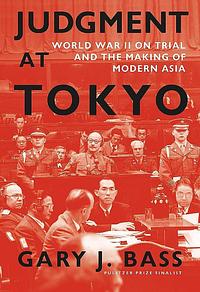Take a photo of a barcode or cover
challenging
informative
slow-paced
challenging
dark
informative
slow-paced
This book was phenomenal and incredibly in depth. The tension between the judges was palpable, while the accused had an eerie serenity. Bass did an excellent job at proving the humanity of each individual, it’s just that these humans were capable and did do horrible things.
informative
reflective
medium-paced
challenging
informative
reflective
slow-paced
Though this book was certainly longer than it needed to be, it was a thoroughly engrossing and fascinating read about an event in history that I knew nothing about. I’m very glad to have read it, challenging though its contents were.
It's difficult to focus on a war crimes trial when the cherry blossoms are coming in. The judges felt so in the spring of 1948, three years into the trial, and the reader will as well. This is an exhaustive book, in scope and detail.
Bass writes well, but I can't shake the feeling this book could've been at least 200 pages shorter. A tighter narrative would've enhanced its readability; as it stands I can't imagine this book anywhere outside of an academic setting, required reading in a course on legal history.
The trial itself was doomed from the start for two reasons. First, the Americans made it clear that Emperor Hirohito was to be excused from prosecution or blame, instead selecting a handful of his cabinet and advisors to take the fall. Secondly, the Americans were prosecuting Japanese leaders for crimes against humanity on the same island were they'd only so recently killed 150,000+ Japanese civilians with nuclear weapons in a successful attempt to end the war.
Sure, it's easy to armchair general a conflict with the benefit of hindsight. There's no denying that a D-Day style assault on the mainland of Japan would've been incredibly devastating for both US soldiers and Japanese civilians conscripted into defense of their home island. My grandfather was a radio operator in the Pacific theater, he lived through it in part because the war was ended before an invasion of mainland Japan. I'm sure he'd be absolutely furious to read my thoughts, safe and warm in my house reflecting back on a war I wasn't in. Nevertheless, I am appalled with the justification used now: that because Japan started the war, any action America took to end it was valid.
Will the day come when the US acknowledges Hiroshima and Nagasaki for what they were: atrocities and crimes against humanity? Until then, the judgment rendered at Tokyo remains a hypocrisy.
Bass writes well, but I can't shake the feeling this book could've been at least 200 pages shorter. A tighter narrative would've enhanced its readability; as it stands I can't imagine this book anywhere outside of an academic setting, required reading in a course on legal history.
The trial itself was doomed from the start for two reasons. First, the Americans made it clear that Emperor Hirohito was to be excused from prosecution or blame, instead selecting a handful of his cabinet and advisors to take the fall. Secondly, the Americans were prosecuting Japanese leaders for crimes against humanity on the same island were they'd only so recently killed 150,000+ Japanese civilians with nuclear weapons in a successful attempt to end the war.
Sure, it's easy to armchair general a conflict with the benefit of hindsight. There's no denying that a D-Day style assault on the mainland of Japan would've been incredibly devastating for both US soldiers and Japanese civilians conscripted into defense of their home island. My grandfather was a radio operator in the Pacific theater, he lived through it in part because the war was ended before an invasion of mainland Japan. I'm sure he'd be absolutely furious to read my thoughts, safe and warm in my house reflecting back on a war I wasn't in. Nevertheless, I am appalled with the justification used now: that because Japan started the war, any action America took to end it was valid.
Will the day come when the US acknowledges Hiroshima and Nagasaki for what they were: atrocities and crimes against humanity? Until then, the judgment rendered at Tokyo remains a hypocrisy.
dark
informative
tense
slow-paced
I had to tap out because the subject matter felt too heavy to keep going with after the election. Hope to return to it down the road.
informative
medium-paced
This book took me two months to read, which is probably the longest it's taken me to ever read any book. It is 1000 pages (not including notes / citations) of very dense content about anything that is tangentially related to the trials themselves: the background of the judges, the sentiment among various government members in the United States at various points including many excerpts from Truman's diary, any historical context that might be relevant like the ongoing clash between Chinese Nationalists and Communists. While I do not think I needed this much detail, even of the actual trial itself, it made me realize how little I knew/learned about the Pacific side of WWII and in some ways I am glad of how comprehensive it was.
I appreciate the author's many nuanced takes, from the racial components of the trial to the US's own culpability (and refusal to deal with it in many cases). I thought the decisions over how to handle the accountability of the emperor were also particularly interesting.
I appreciate the author's many nuanced takes, from the racial components of the trial to the US's own culpability (and refusal to deal with it in many cases). I thought the decisions over how to handle the accountability of the emperor were also particularly interesting.
challenging
dark
informative
slow-paced
A fascinating and thorough read - the hours worked are worn on the page. Despite all the notes, the little details, it never felt like it was dragging. Each element of the history was well-turned into narrative, zooming out to show us the world context and zooming in to show us the minds of important players. And all throughout, reminding us of the big questions at stake (what is justice? how do we create it in an international context? who gets to decide? who gets to mete it out?) without telling us what to think. A triumph of a book.





